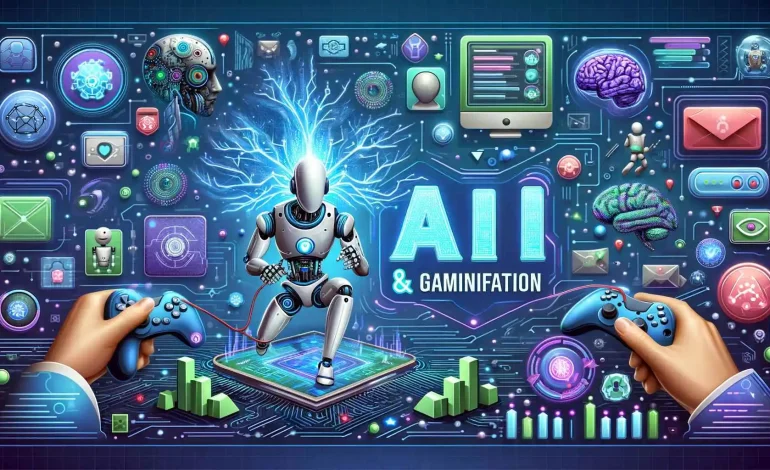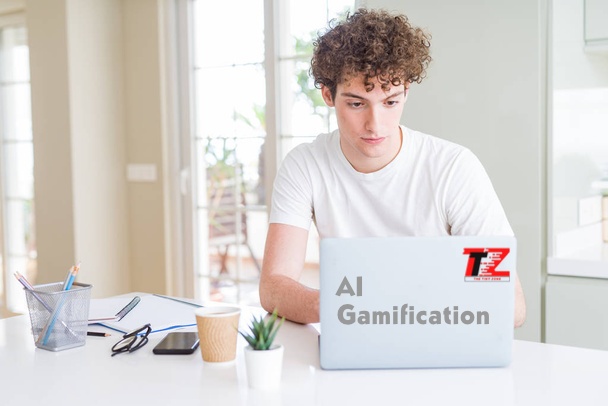
How AI and Gamification Can Create Engaging Learning Experiences
The integration of game elements and mechanics into non-game contexts, has emerged as a powerful tool to enhance learning experiences in various fields. By leveraging the motivational aspects of games, such as competition, achievement, and rewards, gamification transforms traditionally non-engaging tasks into dynamic and interactive activities.
Gamification has been employed to captivate learners, boost motivation, and improve knowledge retention. Elements like points, badges, leaderboards, and narrative-driven scenarios turn educational content into immersive experiences, making the learning process more enjoyable and effective. This approach not only caters to the digital natives’ preference for interactive and engaging content but also fosters a sense of accomplishment, encouraging learners to participate and persist in their educational journeys actively.
The fusion of gamification and artificial intelligence (AI) has emerged as a revolutionary force, breathing new life into education and training. For career-focused individuals aspiring to delve into AI, these insights into the applications of gamification AI could shed new light on the potential for career enhancement and societal impact.
Know More About: GPT66x – What Is gpt66x
Gamification Merging with AI

AI can be employed to create better learning content, automate tasks within courses, assist with tutoring, engage learners, and assess training results. Additionally, AI can implement gamification in a personalized manner to cater to the specific needs of educational programs or industry training.
Gamification platform company Drimify sees AI as challenging common dystopian narratives and emphasizes recent AI advancements as tools beneficial to humanity. In education, gamification tools like their Dynamic Path™ format are seen as effective for engaging learners, with the potential for AI to enhance the learning experience further. They also see the benefits of gamification and AI extending into recruitment, training, and customer experience with optimism about the future impact of these technologies on human potential.
AI’s prowess in processing vast amounts of data and discerning patterns allows for the creation of personalized learning experiences. Through machine learning algorithms, AI tailors’ educational content to the specific needs, preferences, and progress of each learner, ensuring a customized and effective learning path.
Career-Focused Learning Platforms
1. AI-Enhanced Professional Development Courses
Imagine an AI-driven platform that tailors’ courses to an individual’s career goals, adapting content based on real-time assessments of skill gaps and industry trends.
2. Virtual Reality (VR) Job Simulations
Gamification meets AI in immersive VR simulations that replicate real-world job scenarios. This allows learners to apply theoretical knowledge in practical settings, preparing them for the complexities of their future careers.
Real-World Impact Beyond Careers
1. AI-Powered Language Learning Apps
Language learning apps utilize gamification elements, such as rewards and leaderboards, to make acquiring a new language both enjoyable and effective. AI algorithms analyze user performance and adjust difficulty levels for an optimal learning curve.
2. AI-Infused Health and Wellness Games
Gamification AI extends to health and wellness, where apps incentivize physical activity and healthy habits. AI algorithms track user behavior, offering personalized suggestions and rewards, turning fitness into an engaging journey.
Designing Adaptive Learning Platforms
AI professionals play a pivotal role in designing adaptive learning platforms. By leveraging machine learning algorithms, these platforms continuously analyze user interactions, adjusting content and challenges to ensure an optimal balance between difficulty and engagement.
Creating AI-Powered Game Mechanics
1. Dynamic Difficulty Adjustment
AI experts can implement algorithms that dynamically adjust the difficulty of tasks in response to a learner’s proficiency. This ensures that challenges remain stimulating without becoming overwhelming.
2. Behavior Prediction for Personalized Feedback
AI can predict user behavior within gamified learning environments, offering personalized feedback and recommendations. For instance, if a learner struggles with a specific concept, the system can suggest additional resources or alternative learning paths.
Education Accessibility
1. Global Reach of AI-Powered Educational Apps
Gamification AI has the potential to democratize education, making high-quality learning experiences accessible globally. AI-driven educational apps can bridge gaps in educational resources, providing personalized learning opportunities to learners in remote areas.
2. Inclusivity in Learning
By adapting to diverse learning styles and preferences, gamification AI promotes inclusivity. Individuals with varying abilities and backgrounds can engage with educational content in ways that suit their unique needs, fostering a more inclusive learning environment.
Skill Development for Social Causes
1. AI-Enhanced Gamified Volunteer Platforms
Imagine a platform that combines gamification and AI to encourage users to contribute to social causes. AI algorithms could match individuals with opportunities based on their skills and preferences, turning volunteering into a rewarding and engaging experience.
2. Sustainable Practices Learning Games
Gamification AI can be applied to educate individuals about sustainable practices. Users can navigate virtual environments, making decisions that impact the environment, while AI analyzes their choices to provide insights into sustainable living.
Continuous Innovation and Collaboration
1. Interdisciplinary Collaboration
The intersection of AI and gamification demands collaboration between AI professionals, educators, psychologists, and game designers. This interdisciplinary approach is essential for creating holistic and effective gamified learning experiences.
2. Embracing Emerging Technologies
AI professionals must stay abreast of emerging technologies such as augmented reality (AR) and blockchain, exploring how these innovations can further enhance gamified learning experiences.
3. The Need for Ethical Considerations
As AI collects and processes user data, ensuring robust privacy measures becomes paramount. Striking a balance between personalization and user privacy is a challenge that AI professionals must navigate. AI-driven gamification systems need to be vigilant against bias, ensuring that learning experiences are fair and unbiased across diverse user demographics.
3. Working on AI Gamification Projects
Job seekers and career changers might find the field of AI and gamification intriguing due to its vast potential and diverse applications. The combination of AI and gamification offers innovative solutions across various industries, from education and training to customer engagement and recruitment. The prospect of leveraging AI to enhance learning experiences through gamified content, creating adaptive educational tools, and developing personalized assessments is particularly appealing.
Career changers might take their first steps into this career through a bootcamp focused on applying AI as they enter this new workforce. Then, they should identify specific educational challenges that AI and gamification can address, such as personalized learning or student engagement.
The paths to creating gamified and AI-driven educational tools and platforms are endless. They could help determine how gamification elements, like points and badges, can be customized to motivate students and track progress. They could apply AI to develop adaptive learning platforms, AI-enhanced assessments, and virtual tutoring systems allowing for personalized and dynamic educational experiences. Implementing predictive analytics aids in forecasting student performance and proactively addressing challenges.
Another path would be collaborating with educators to ensure that AI-driven gamified solutions align with educational goals. Staying updated on innovations and actively participating in communities helps individuals remain at the forefront of emerging technologies. Finally, piloting small-scale projects allows for testing and iteration based on real-world feedback, contributing to the continuous improvement of AI-enhanced gamified educational experiences.
At The End
For career-focused individuals eager to dive into the captivating world of AI, the marriage of gamification and artificial intelligence offers an exciting path toward skill development, career advancement, and societal impact.





